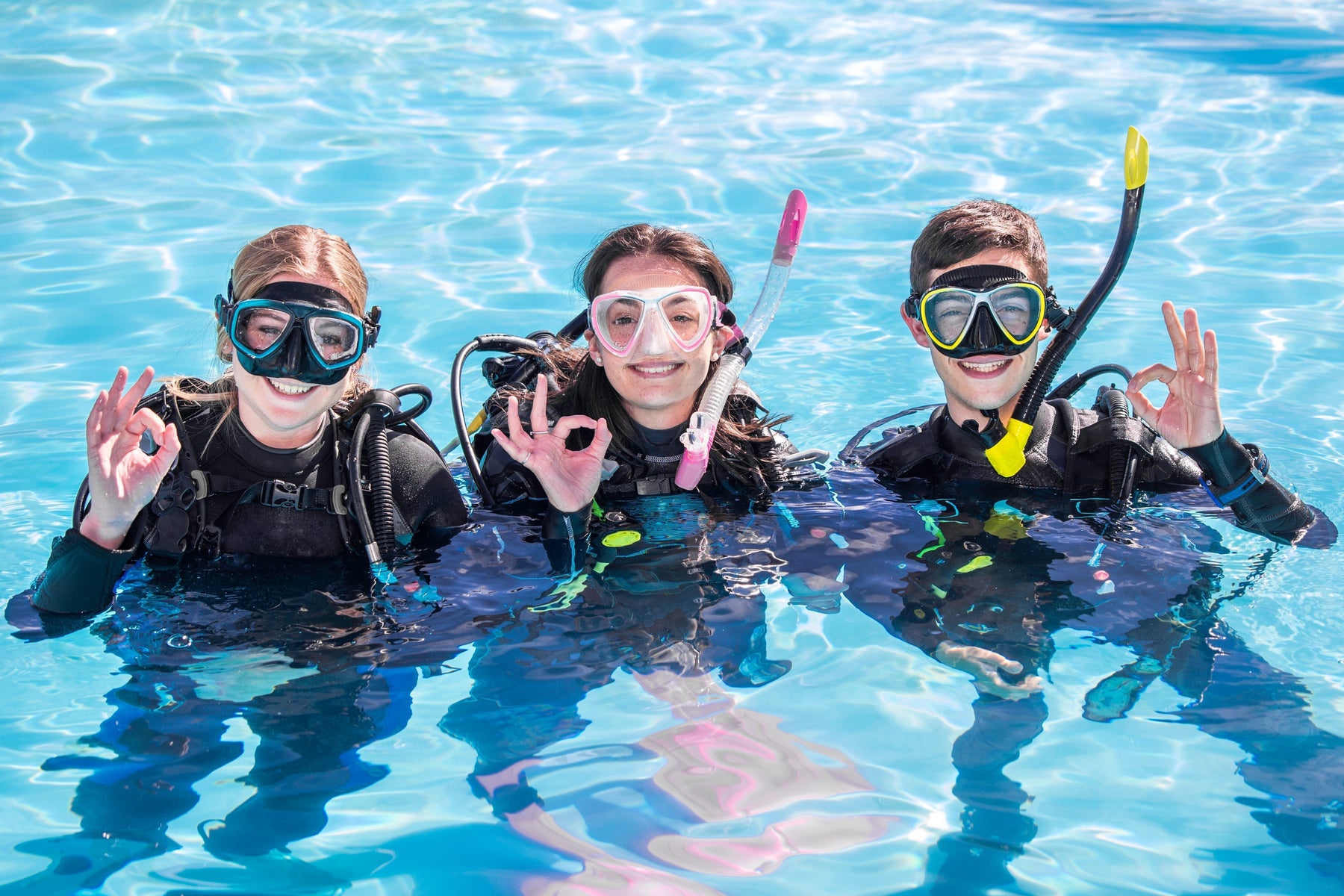Or WhatsApp us on +971507703483

Is Diving a Risk? Let’s Talk About It.
Scuba diving has long held a reputation for being both exhilarating and to some - intimidating! The thought of breathing underwater, swimming alongside marine life, and descending into the unknown can feel thrilling but also raise concerns: Is diving dangerous? What are the risks involved?
At DiveCampus, we believe in addressing these questions head-on with clarity, transparency, and most importantly - FACTS!
So how likely are you to be injured while diving?
The most common medical issues associated with scuba diving are sunburn, seasickness and dehydration(all of which are preventable). There are actually few injuries requiring any sort of medical attention associated with diving. On average, there are only 1,569 scuba-related emergency room admissions in the US each year.
In comparison to other common sport activities, the estimated average annual ER admissions in the US are:
|
Sport |
Estimated average annual ER admissions (US, 2016-2020) |
|
Swimming |
101,822 |
|
Fishing |
65,728 |
|
Volleyball |
48,582 |
|
Horseback riding |
45,235 |
|
Golf |
36,616 |
|
Snowboarding |
19,706 |
|
Bowling |
15,055 |
|
Scuba diving |
1,569 |
Source: US Consumer Product Safety Commission / NEISS (US Data, 2016-2020)
Let's understand the Real Risks
Like any adventure sport, scuba diving comes with inherent risks. However, when practiced with proper training, equipment, and guidance, it is an incredibly safe and rewarding activity. According to data from the Divers Alert Network (DAN), recreational scuba diving has one of the lowest incident rates compared to other outdoor sports.
So what are the real risks?
-
Barotrauma and Equalization Issues: These can occur if divers fail to equalize properly during descent or ascent. However, basic training and good habits effectively prevent this.
At DiveCampus, we give special focus to equalization during confined water sessions. Unlike most pools in the UAE (which are only 1.5 to 2 meters deep), our custom-built DiveTank is 4 meters deep—allowing students to practice equalization before their first sea dive. This early exposure builds skill and confidence. - Decompression Sickness (DCS): Commonly known as “the bends,” DCS is rare in recreational diving and is avoidable with proper dive planning, adherence to depth/time limits, and controlled ascents. At DiveCampus, our instructors instill safe dive practices from the very first Open Water course. We emphasize conservative dive profiles, proper surface intervals, and safety stops - making every dive “DCS-safe.”
- Equipment Malfunction: Modern dive gear is built for safety, but regular maintenance and pre-dive checks are essential. We only use high-quality, regularly serviced equipment and teach our students how to recognize well-maintained gear. During training, you’ll also learn essential troubleshooting and emergency protocols.
- Panic or Poor Judgment: Most dive-related incidents are caused by diver error. Confidence-building through thorough training is key. That’s why we never rush our courses. We maintain the best student-to-instructor ratios in the region, ensuring every diver gets the attention and practice they need to feel calm and in control underwater.

Not All Dive Training is Equal
One of the most overlooked risks in diving doesn’t come from the ocean—it comes from poor-quality instruction.
In recent years, there’s been a surge of budget dive offers promising quick certifications at the lowest possible price. While these may sound appealing, especially to beginners, they often come at the expense of safety: rushed courses, inadequate supervision, limited pool time, skipped skills, and instructors who are under-qualified or overbooked.
Scuba diving is not about getting a card—it’s about learning life-saving skills, building confidence, and making smart decisions underwater. When corners are cut, the results can be dangerous.
At DiveCampus, we’ve retrained many divers who were not taught basic buoyancy control, mask clearing, emergency procedures—or even how to assemble their gear. These are not minor oversights—they are critical skills for safe diving.
Choosing a reputable, accredited dive center with experienced instructors is not just a matter of quality—it’s a matter of safety.
Safety Through Education
Education is the single most effective way to reduce risk in scuba diving.
All PADI courses are designed to build skills progressively, with safety and awareness at their core. From your very first Try Dive to becoming a Rescue Diver, you’ll learn to dive responsibly, check your equipment, plan dives safely, and stay within your limits.
At DiveCampus, our experienced instructors are committed to making sure every diver is fully prepared before entering the open water. No shortcuts, no compromises—just solid training.
Diving is Not Reckless—It's Responsible Adventure
We often say: “Scuba diving isn’t about risk-taking. It’s about risk management.”
When done right, diving is safer than driving to work or walking across a busy street. Every day, thousands of people dive safely all over the world—from shallow coral reefs to deep wrecks and caves.
Beyond safety, diving teaches mindfulness. It builds patience, sharpens your awareness, and fosters a deep respect for nature—for the ocean, your dive buddy, and yourself.
So, Is Diving a Risk?
Yes - just like cycling, hiking, or skiing. But with proper training, the right mindset, and a reputable dive center, it becomes a safe, empowering, and life-changing experience.

Invest in your training. Ask questions. Know your instructors. And always choose quality over shortcuts.
At DiveCampus, we’re not just in the business of teaching diving — we’re committed to creating confident, capable, and environmentally conscious divers. Whether you're starting your journey or leveling up your skills, we’re here to support you every step of the way.
Ready to dive into the safest and most professional training experience in the region?
Explore our PADI courses or get a FREE consultation with one of our instructors today at 800 SCUBA (72822).



Leave a comment